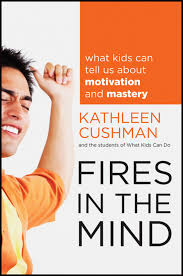
This has been a summer of attempting to get through many of those books which have lived on the shelves of three different houses now without actually having, you know, been read.
Aside from the weak-willed ordering of still more books from Amazon and picking up a few the other day at the local privately-owned book store, I’m making progress.
Today, I finished Kathleen Cushman’s Fires in the Mind. It earned two stars from me on GoodReads.com, but I wanted to want to award it much more.
Cushman and her teenage collaborators take as their focus of investigation the idea of expertise and how a person becomes an expert. As they work through these ideas in the first few chapters, they turn their attention to schools and what formal education systems can do to encourage the same kinds of mind fires as students’ outside interests as discussed in the first half of the book.
From just this premise, I was hopeful. It’s a topic that has the potential to illuminate faculty meetings, and pre-service teacher classrooms everywhere. What are we doing in education if not working to encourage students’ curiosity and ability to work toward expertise?
The book falls short in a few ways.
First, Cushman laces the text with quotations from her “collaborators” throughout. These were teenagers who participated in the Practice Project as an attempt to answer the questions mentioned above. The quotations made the reading choppy and I found myself working to hold on to a singular narrative voice. While appreciating the inclusion of direct ideas from students, I often found myself wishing they had written the book outright alongside Cushman rather than Cushman trying to put their words where she felt they belonged.
Similar to this, the student quotations are apparently taken verbatim from student interviews. As such, they include the odd error in traditional grammar. I suppose this is an attempt to validate the approach and show that these are regular kids offering up their ideas in their own voices. I celebrate that idea. At the same time, should Cushman have faltered from Standard Formal English, her editor would surely have dinged her on the mistake.
If we are talking about kids becoming authentic collaborators, it feels wrong to lower the bar for how their words are presented.
The other fault I found as I was reading was the lack of direct references to others who have walked this way before and done the work of research expertise and engagement. Perhaps this was done so as not to crowd out the students’ voices. For me, though, it ended up taking the legs out from under the text. I would be far more likely to recommend this book to others if the student researchers’ findings sat alongside and made reference to the others in the field doing this work. At the back of the book, Cushman acknowledges that the work of the Practice Project was informed by the writings and research of many others and lists those texts, writing that she was glad the students were able to read the other authors’ work.
By hiding this until some curious reader tries to figure out what’s happening, the book creates a sort of fence around the students’ work that keeps it in a different arena than the experts. This keeps them as “student experts” rather than full-fledged “experts” and the separation was a perpetual frustration for me.
If you are going to pick up this book, and I’m sure there are those who would benefit from its reading, start in the middle. This is where the text starts to wrap the students’ findings around the everyday work of schools. Each chapter in the concluding half included passages that sought to provide concrete suggestions for making homework worthwhile, creating engaging projects, etc. I almost missed this when I considered putting the book down and walking away early on.
As I was reading Fires in the Mind, I was hesitant to acknowledge my criticisms of the text. I finally came to terms with the fact that criticizing the book was not the same as criticizing the important work and her collaborators engaged in throughout the Practice Project.
The project sounds as though it was worthwhile, informative and engaging for students. The retelling of the project, however, left me wanting more.
Like this:
Like Loading...
 This has been living on the ‘
This has been living on the ‘